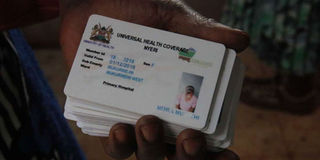We’re leaving out the most critical driver of UHC

Reflecting on the past eight months, it is critical to note the focus of care has been on curative healthcare driven by policymakers, health technocrats and NGOs. The user has remained absent in decision making. PHOTO | FILE | NATION MEDIA GROUP
The current health buzz across the country and world over is universal health coverage (UHC).
In September, the UN High-Level Meeting on UHC featured deliberations among heads of state on UHC. In December 2018, the UHC pilot was launched in Kisumu, Isiolo, Machakos and Nyeri. The country roll-out is supposed to begin soon.
Reflecting on the past eight months, it is critical to note the focus of care has been on curative healthcare driven by policymakers, health technocrats and NGOs. The user has remained absent in decision making.
In an era where person-centred care is emphasised, it is important that quality, equity and dignity are the key principles adhered to during the delivery of healthcare services.
UHC can only be achieved when healthcare is provided in a comprehensive and integrated approach at primary healthcare level and that citizen-defined care is appreciated. As a country, we often formulate policies and design programmes without considering the consumers.
The UHC design and roll-out appears more like the government’s and president’s legacy agenda. UHC is being framed as a privilege rather than a right for every citizen. World Health Organisation defines UHC as service accessible to all people and communities.
PROTECT AGAINST EXPLOITATION
The element of equity in access to health services to ensure everyone can get them, and not just the one who can pay for them, is crucial. UHC further emphasises on the principle of quality of health services.
But, can we say as a country we have embraced UHC and all its elements are well addressed? Looking at the UHC design, what it entails and models of operation currently, there are a few omissions.
We must find out what the UHC reforms are achieving across the range of social values and the associated outcomes that are central to PHC: equity, people-centeredness, protection of the health of communities and citizen participation.
These big UHC questions must always be in every UHC conversation: Is the care comprehensive, integrated, continuous and effective? Is access guaranteed and are people aware of what they are entitled to? Are people protected against the financial consequences of ill-health? Is there a group that is being left behind? Is the government effective in ensuring protection against exploitation by commercial/private providers? What does equity look like? Who has always been left behind in healthcare provision?
A survey conducted by the White Ribbon Alliance and partners, that reached over 150,000 women and girls in Kenya, established the real need of user perspective. May be this has been the missing link in determining what care should look like.
The simple, but paramount, question, “what is your top most request for quality reproductive healthcare?” unearthed different perspectives as to what quality means to users, far from what the usual technocrats believe is the definition of quality.
To be treated with respect while seeking and receiving healthcare; water, sanitation and hygiene; health information and education and adequate medicine and supplies were the top demands from the campaign, resonating equally across nearly all age groups.
What women want was an unprecedented, deep, one-woman-at-a-time enquiry into what the real experts want for their own healthcare. It was an enquiry into values; into how women value themselves, how women are valued, how we value the evidence supplied by their voices and their lived experiences.
Angela Nguku is the founder and the executive director of the White Ribbon Alliance for Safe Motherhood Kenya


